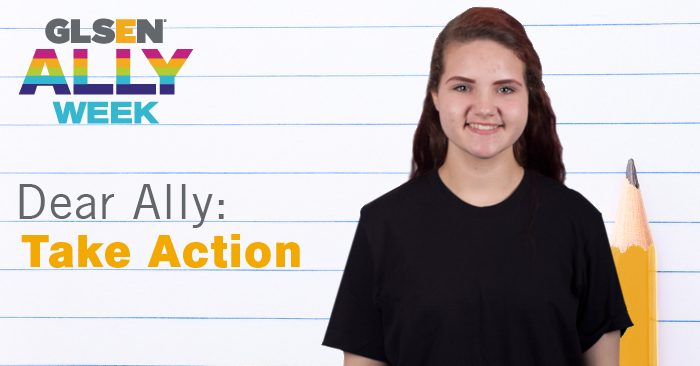Dear Ally: Take Action

Dear Ally,
What does being an ally mean to you?
Is it a title that you can show off to your friends to exclaim how liberal and open-minded you are? Is it a way to rebel against society and be different? Or maybe it’s something you call yourself just because other people do it and you want to fit in.
To many people, being an ally is nothing more than a title. Some people think that this four-letter word only conveys whether or not someone is a good person. But what people often forget is what being a good ally actually entails. Sometimes, “allies” can get so caught up in the label that they forget what it actually means. So I pose to you this question: What does being an ally really mean?
It isn’t just something for straight people, which is a common misconception. Allyship relates to privilege, whether that be straight, cisgender, white, male, neuro-typical, able-bodied, or any other kind of privilege. Being an ally involves a constant awareness of our privileges, and a constant awareness of others’ oppressions. It requires knowing when to speak up and say something as an ally, and knowing when to step down and make sure you’re not speaking for anyone in an oppressed group. Mostly, being an ally is practicing tolerance, acceptance, and the willingness to fight with (not for) a marginalized group for equality and justice.
You don’t get to decide you’re an ally one day, write it on your social media bio, and rest there. Being an ally is not a resting place; that’s not how it works. It is a constant, working relationship. It’s something that requires flexibility, patience, and most importantly, action. Being an ally is not inert; it’s active. Ally is not a noun. It’s a verb. It’s not a crutch or an excuse for bad behavior. It’s not a “get out of jail free” card.

So, what can you do to become a better ally? Act. A huge part of being an ally is self-education and making sure that you are up-to-date on the relevant issues. Making sure you use the correct language when speaking about marginalized groups—and learning about the correct history of oppression—is also important. These are both good self-reflective actions you can take to become a better ally, and they will aid you in engaging in knowledgeable conversations in schools, being a part of the movements without being a dominant voice, and persistently challenging structures that hold up the cycles of oppression.
Being an ally is about finding the bravery in yourself to stand up against oppression whenever you see it instead of just choosing to walk away. Because while allies may have the luxury of walking away, individuals in marginalized groups don’t have that luxury. Allies might be able to check out of a conversation, but those in marginalized groups can’t check out of their race, gender, sexual orientation, or other identifying factors.
Sometimes, standing up against oppression will make you feel uncomfortable. But allyship is not about being comfortable. It’s about fighting oppressive powers, and supporting those who don’t have those powers.
Allies can never stop learning and striving to be better. There will always be places for growth in tolerance, education, and vocalization. Being an ally is a constant battle towards a lasting change, and it is supporters like you who can make that change a reality. As a minority group, the LGBTQ community alone may not be able to do all we want to, but with allies on our side, we are stronger.
Thank you for your endless support. Learn more about being a better ally to LGBT youth on GLSEN’s Ally Week webpage.
--Katie Regittko
Katie Regittko is a member of GLSEN’s National Student Council.
